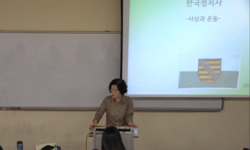South Korean policies towards North Korea under Roh Moo-hyun and Lee Myung-bak administrations remains under serious consideration regarding the use of economic engagement to foster needed changes in the North Korean economic system. Public opinio...
http://chineseinput.net/에서 pinyin(병음)방식으로 중국어를 변환할 수 있습니다.
변환된 중국어를 복사하여 사용하시면 됩니다.
- 中文 을 입력하시려면 zhongwen을 입력하시고 space를누르시면됩니다.
- 北京 을 입력하시려면 beijing을 입력하시고 space를 누르시면 됩니다.
https://www.riss.kr/link?id=A99721872
- 저자
- 발행기관
- 학술지명
- 권호사항
-
발행연도
2013
-
작성언어
Korean
- 주제어
-
등재정보
KCI등재
-
자료형태
학술저널
- 발행기관 URL
-
수록면
153-182(30쪽)
- 제공처
-
0
상세조회 -
0
다운로드
부가정보
다국어 초록 (Multilingual Abstract)
South Korean policies towards North Korea under Roh Moo-hyun and Lee Myung-bak administrations remains under serious consideration regarding the use of economic engagement to foster needed changes in the North Korean economic system. Public opinion surveys have shown that South Koreans are divided into two groups?those who support engagement policies and those who support disengagement policies. However, what individual policy preferences are and what affects the establishment of individuals’ North Korea policy preferences have received little attention in inter-Korean relations studies. This study examines the determinants of individual policy preferences and the continuities and changes of the determinants of South Korean policy towards North Korea under Roh(2007) and Lee(2012) administrations, using the individuallevel survey data conducted by the Institute for Peace and Unification Studies of Seoul National University. This study shows that although the levels of public support for each administration’s policies towards North Korea are not much different, individuals are likely to support the policy based on their ideational position and regional background which become close to those of the incumbent president and ruling party. It also finds that individuals prefer engagement policy to disengagement policy if they have a strong and intense aspiration for the reunification of the two Koreas. These findings illustrate that there may be differences between elite opinion and public opinion even if public discourse on the South Korean government’s policy towards North Korea has been dominated by elite opinion.
목차 (Table of Contents)
- Ⅰ. 문제제기
- Ⅱ. 이론적 논의 : 개인의 특성과 정책선호
- Ⅲ. 대북정책 비교와 가설 : 노무현 정부 대 이명박 정부
- Ⅳ. 통계분석 결과
- Ⅴ. 결론
- Ⅰ. 문제제기
- Ⅱ. 이론적 논의 : 개인의 특성과 정책선호
- Ⅲ. 대북정책 비교와 가설 : 노무현 정부 대 이명박 정부
- Ⅳ. 통계분석 결과
- Ⅴ. 결론
- 참고문헌
동일학술지(권/호) 다른 논문
-
문화의 차원에 비추어 본 다문화사회로서의 한국의 특수성
- 고려대학교 아세아문제연구소
- 서덕희(Seo, Deok-Hee)
- 2013
- KCI등재
-
- 고려대학교 아세아문제연구소
- 유승무(Ryu, Seung-Moo)
- 2013
- KCI등재
-
시진핑(习近平)지도체제의 등장과 중국의 정치개혁과 정치변화 전망
- 고려대학교 아세아문제연구소
- 이정남(Lee, Jung-Nam)
- 2013
- KCI등재
-
- 고려대학교 아세아문제연구소
- 김영민(Kim, Young-min)
- 2013
- KCI등재





 DBpia
DBpia



